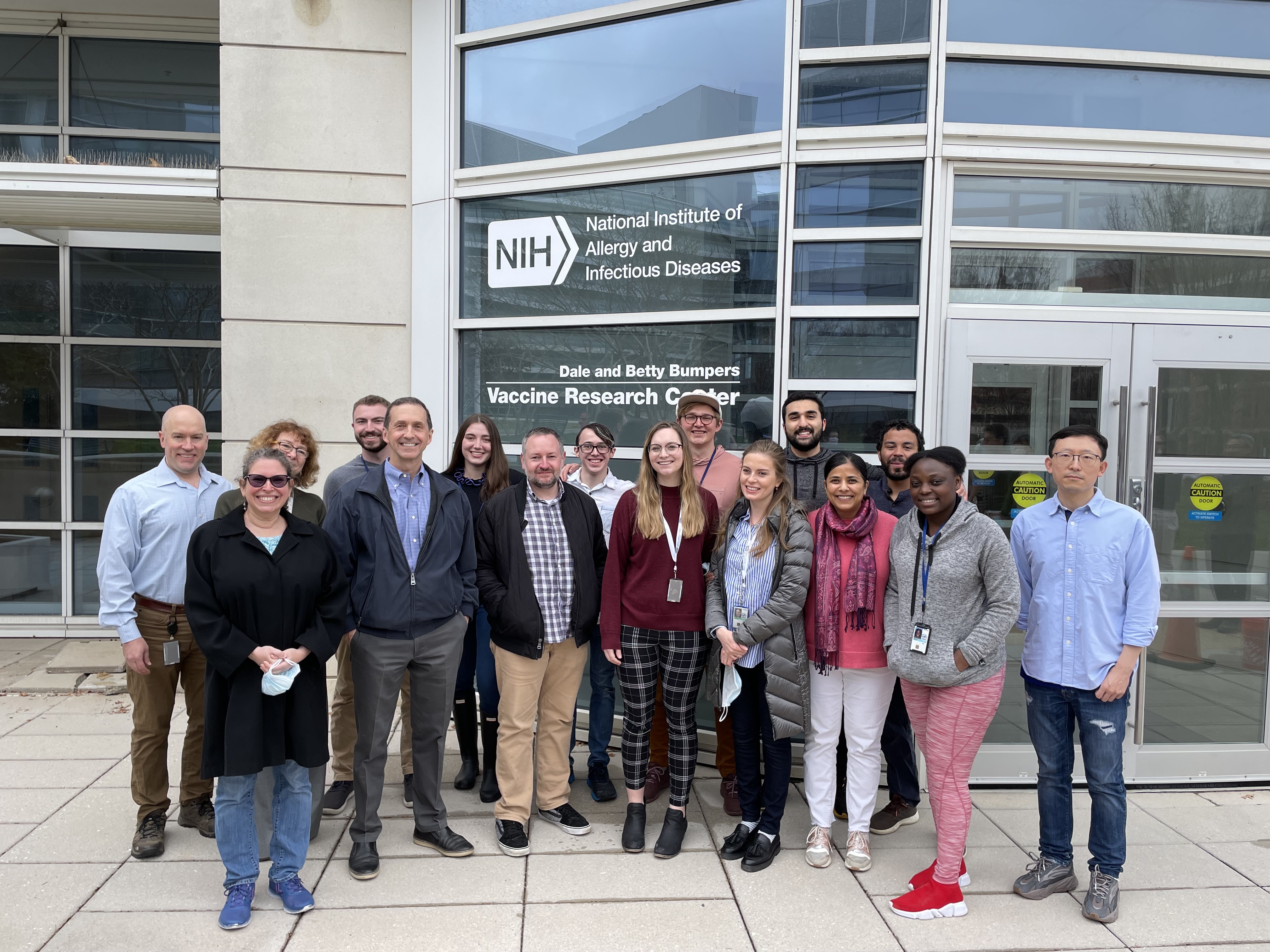Humoral Immunology Section
Theodore C. Pierson, Ph.D.
Chief, Arbovirus Immunity Section
Director, Vaccine Research Center
Acting Chief, Humoral Immunology Section
Contact: piersontc@mail.nih.gov

Major Areas of Research
- Characterize protective immune responses against HIV-1 with a focus on B cells
- Study the natural immune response to HIV-1
- Develop novel strategies for vaccine design
Program Description
The Humoral Immunology Section (HIMS) focuses on understanding antibody-mediated protective immune responses against HIV-1 using studies of both the plasma antibody compartment and the B-cell compartment. The goal of these studies is to elucidate mechanisms of virus neutralization and the viral epitopes targeted by neutralizing antibodies and to translate this information into novel strategies for vaccine design. Our laboratory works closely with the structural biology laboratories at the VRC to design and evaluate novel vaccines. New vaccine immunogens are designed based on the latest information from the atomic level structure of the HIV-1 Env glycoprotein complexed to neutralizing antibodies. Our laboratory evaluates the antibody specificities elicited by these vaccines, including the neutralizing activity of sera and the viral epitopes that are vulnerable to neutralizing antibodies. Molecular reporter virus assays allow the study of diverse virus isolate from various regions of the world to understand the effect of genetic and antigenic diversity and viral escape on neutralizing antibody responses.
We also study the natural immune response to HIV-1 by analyzing the development of serum antibody responses and by analyzing B-cell responses at the level of single antigen-specific B-cells. Such methodologies allow a detailed dissection of the humoral immune response to HIV-1 with the goal of understanding how a broadly reactive neutralizing antibody response develops during the course of natural HIV-1 infection and understanding how the humoral immune system targets vulnerable regions on the HIV-1 Env glycoprotein. Multicolor flow cytometry is used to study the B-cell compartment and to identify antigen-specific B-cells from which monoclonal antibodies can be isolated. The PCR-based reconstitution of HIV-1 specific monoclonal antibodies from B cells, together with deep sequencing of antibody gene transcripts, allows us to track the evolution of the humoral immune response against HIV-1 and to interrogate mechanisms of viral immune evasion from neutralizing antibodies. The information from these pathogenesis studies, together with studies of the antibody response elicited by vaccine immunogens, is used to inform the design of improved antibody-based vaccines for HIV-1.
For more information on research conducted by the Humoral Immunology Section, visit the Humoral Immunology Core.
Biography
Education
Ph.D., 2001, The Johns Hopkins University School of Medicine, Baltimore, MD
Dr. Ted Pierson is the Director of the VRC. As Director, he leads the VRC’s comprehensive basic, translational, and clinical research programs focused on designing, developing, and testing candidate vaccines and biologics against HIV/AIDS, coronaviruses, influenza, and emerging infectious diseases with pandemic potential. Dr. Pierson also serves as Chief of the VRC’s Arbovirus Immunity Section. His research explores fundamental and translational questions related to arbovirus assembly and entry, humoral immunity, and vaccine design and evaluation.
Dr. Pierson received a B.S. in marine science from Eckerd College and a Ph.D. in immunology from the Johns Hopkins University School of Medicine. During his graduate studies with Dr. Robert F. Siliciano, he investigated the molecular biology of the pre-integration state of HIV-1 latency and the contribution of this reservoir toward the persistence of HIV-1 in humans. Dr. Pierson trained as a postdoctoral fellow and research associate with Dr. Robert W. Doms at the University of Pennsylvania, where he developed an interest in the virology and immunology of arboviruses, including West Nile and dengue viruses. In 2005, Dr. Pierson was recruited to the NIAID Division of Intramural Research program’s Laboratory of Viral Diseases (LVD) to initiate an independent research program focused on flavivirus biology, and in 2011, became a tenured Senior Investigator and Chief of the Viral Pathogenesis Section. He was named Chief of the LVD in 2018 and served in that role until he was appointed VRC Director in 2023.
Dr. Pierson served as the Deputy Scientific Director and later Scientific Director of the NIH Oxford Cambridge Scholars Program between 2014-2018. He has co-authored more than 130 publications and has served on the editorial boards of several scientific journals and as an editor for PLoS Pathogens and the Journal of Virology. Dr. Pierson is an American Academy of Microbiology Fellow and recipient of the NIH Director’s Ruth L. Kirschstein Mentoring Award.
Research Group
The Humoral Immunology Section studies the antibody response to HIV-1 and SARS-COV-2 infection or vaccination. Ongoing research focuses on antibody discovery and antibody-virus co-evolution in infected patients or non-human primate models, with the goals of providing templates for vaccine design and antibodies with potential for clinical utility in preventing or treating infection.


